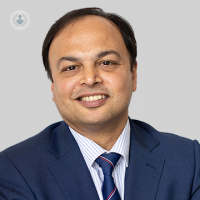Fibroids: do they affect fertility or pregnancy?
Escrito por:Fibroids are localised condensed thickening of muscles (wall) of the womb (uterus). They all start within the muscle of the womb but as they grow they may grow outside the wall and cause discomfort by virtue of their size or pressure on the urinary bladder in the front or bowel in the back, which leads to an increase in the frequency of passing urine, or urine infection, or constipation.
They may also grow into the cavity of the womb, causing heavy and irregular periods and bleeding or difficulty in conceiving (fertility problems). Fibroids are the commonest tumours (growth) in women. Up to 70% of women have them, though in 90% of them they may not cause any symptoms. Black and South Asian women are more prone to develop fibroids.
Leading gynaecologist and fertility consultant Mr Parijat Bhattacharjee explains whether fibroids affect a woman's ability to conceive and if they can have any effect throughout different stages of her pregnancy.
Can fibroids affect fertility?
Fibroids may affect fertility depending on their location and size. Fibroids that protrude inside the cavity of the womb affects fertility and need to be removed usually through hysteroscopy (from below, without a cut on the tummy and with the procedure as a day case). If they are not distorting the cavity, there may affect fertility particularly if they are close to the tubes. Fibroids over 5 cm in size are generally removed either by keyhole or open surgery to improve fertility.
Can fibroids affect stages of pregnancy?
Fibroids are hormone dependant growths and generally grow in size in pregnancy. However, mostly they do not cause any problems unless they are big (generally over 5 cm) when they may degenerate and cause pain. Pain killers are all that is needed, once other causes of pain are excluded.
If fibroids are in the lower part of the womb, they may prevent the baby’s head from coming down and increases the possibility of a caesarean section. There is a slightly higher risk of bleeding after delivery, in the presence of fibroids. Rarely, fibroids that grow outside the womb may grow a stalk and twist on itself causing intense pain and sometimes needing surgery to remove them.
What does fibroid pain feel like during pregnancy?
Fibroid pain generally is a dull aching type. However, it can be intense, generally constant (not period-like). The pain may be severe enough to need hospital admission for strong pain killers. It is self-limiting, i.e. settles with pain killers.
Can they be removed during pregnancy?
Fibroids are best left alone in pregnancy. Apart from the risks to the baby due to surgery and anaesthesia, there is increased risk of bleeding and anaesthetic risks for the mother. Surgery is best done after the pregnancy (or before pregnancy if fertility is affected)
Can fibroids disappear without treatment?
Fibroids are dependent on hormones to grow, so after menopause, they shrink and may disappear. Most fibroids do not need treatment since they rarely become cancer and often do not cause problems. If they do, they can be removed by keyhole or open surgery (depending on their location, size and number) or treated by uterine artery embolization (by blocking the main blood vessel of the womb, starving them of blood and nutrition). There is a drug available to reduce its size but because of side effects, mainly used before surgery for a short period of time.



